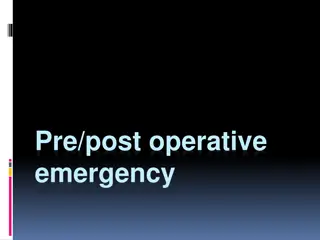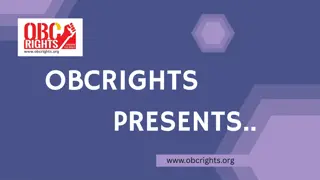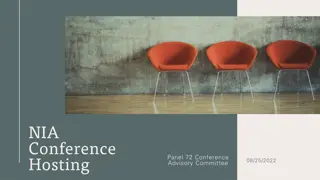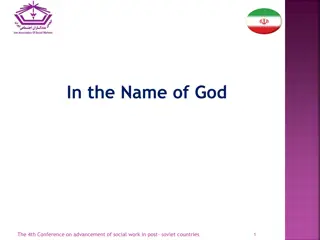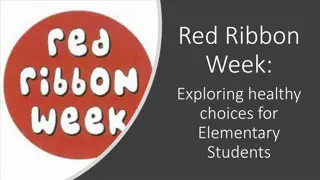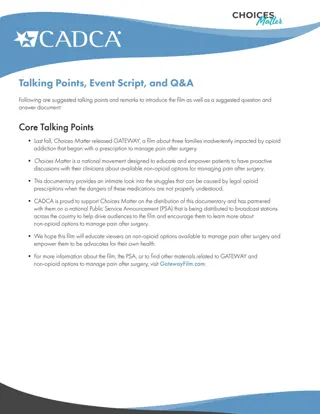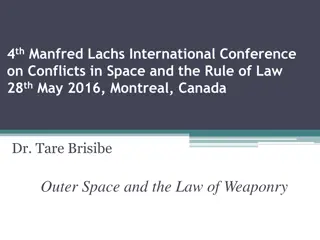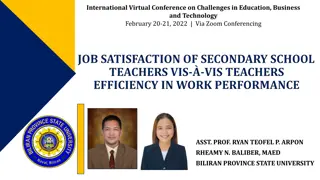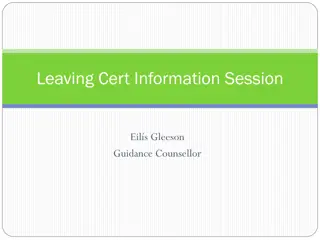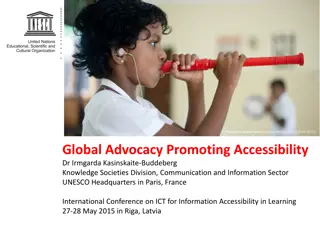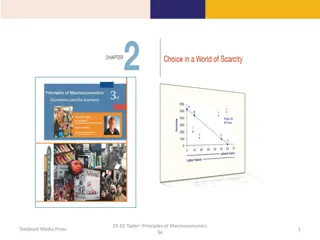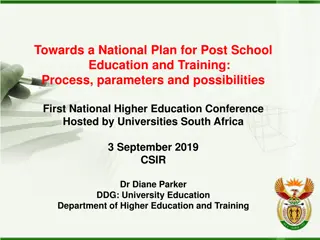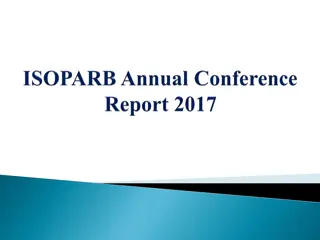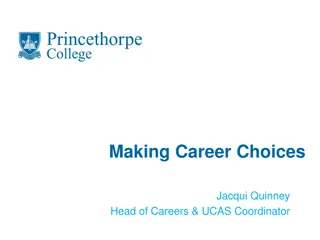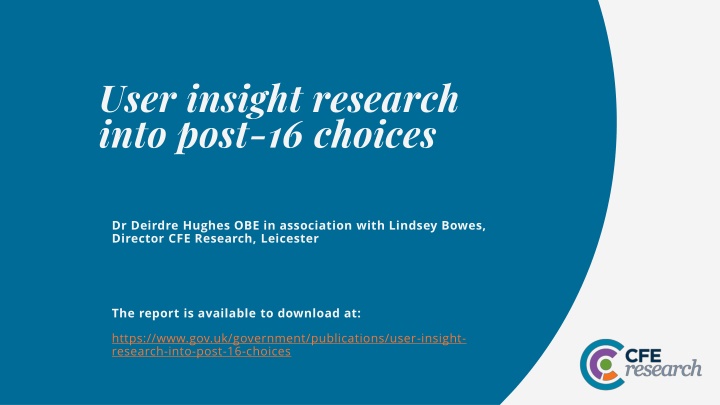
Young People's Post-16 Choices Research Report
Gain insights from the research conducted by Dr. Deirdre Hughes OBE and Lindsey Bowes into young people's decision-making processes regarding post-16 choices. Explore the challenges they face, sources of information used, and the role of advice and guidance in shaping their educational pathways. The report delves into the complexities of the post-16 educational landscape and the impact on learners' fully-informed decisions.
Uploaded on | 0 Views
Download Presentation

Please find below an Image/Link to download the presentation.
The content on the website is provided AS IS for your information and personal use only. It may not be sold, licensed, or shared on other websites without obtaining consent from the author. If you encounter any issues during the download, it is possible that the publisher has removed the file from their server.
You are allowed to download the files provided on this website for personal or commercial use, subject to the condition that they are used lawfully. All files are the property of their respective owners.
The content on the website is provided AS IS for your information and personal use only. It may not be sold, licensed, or shared on other websites without obtaining consent from the author.
E N D
Presentation Transcript
User insight research into post-16 choices Dr Deirdre Hughes OBE in association with Lindsey Bowes, Director CFE Research, Leicester The report is available to download at: https://www.gov.uk/government/publications/user-insight- research-into-post-16-choices
Overview Young people s career decision making New insights Lessons learned Moving forward
Research aims & objectives
The research set out to test the hypothesis given the current complexity of the post-16 educational landscape, learners can experience difficulties making fully-informed choices, and navigating technical education routes in particular
The aim of the research was to understand how young people make educational choices by exploring: whichsourcesof information they use to inform their decisions when in the student lifecycle decisions about post-16 study are made, and how advice and guidance and application systems interact to shape and influence choices. The demand for and the potential advantages of a centralised digital course and application system to support effective decision-making were also explored.
Mixed-methods approach Learner survey Learner interviews Follow-up interviews with sub- sample of 24 learners: 7 FEC learners 5 Sixth Form College/School Sixth Form learners 5 1st year undergraduates 7 Apprentices Mixed-mode survey of 2,017 learners: 561 FE (Academic) 530 HE (Academic) 926 Technical (FE & HE)
Key findings: Making decisions about post-16 choices
When young people make decisions When in the lifecycle decisions are made varies by route and pupil characteristics I chose Law because I did it at GCSE and A level. I enjoyed it, and I was quite good at it. I did some work experience before I studied, but that was what I wanted to go into. A small proportion of pupils start thinking about post-16 choices as early as primary school, but most do not make a final decision until the year prior to making a transition Those on academic routes are more likely to make a final decision earlier than those on a technical pathway. HE Student
How young people make decisions Individual sources of help and advice Vast majority of young people consult with at least one individual for help and support and most commonly turn to informal sources such as parents/carers, friends and teachers I did speak to one of my dad s friends who works in software engineering, and he actually studied mechanical engineering and then switched to software. He gave me quite a bit of insight as to what it s about, and what sort of people it will suit. FEC student
How young people make decisions Individual sources of help and advice The careers adviser in school was very helpful. We talked about various options and listed the pros and cons. Although more limited use is made of careers advisers and local employers, those who do consult them find them useful. Apprentice I met with employers at a school fair, I spoke with my teachers and then had an interview with a careers adviser to think through my ideas all of this was really helpful. Apprentice
How young people make decisions Most teachers are well rehearsed in what to do when it comes to applying to uni, but few really know about apprenticeships and work opportunities. If you re going to uni that s fine, but what about everyone else? I had to be strong and stay determined with my decision not to follow everyone else. Individual sources of help and advice Typically, those on technical pathways regard help as less useful than those on other routes Some felt schools pushed academic routes Others described information about technical routes such as apprenticeships as too vague and not sufficiently detailed to inform the decision-making process. Apprentice I was quite concerned about the day-to-day job because a lot of apprenticeships are really vague in their descriptions. It makes you not trust them. Am I actually going to do proper work? Am I going to be treated differently? I liked quite a few [resources] which had quotes from people who already do the apprenticeship I used Not Going To Uni and the National Apprenticeship Service website. Apprentice
How young people make decisions Tools and resources 20% of Technical (FE/HE) learners did not use tools and resources compared with 4% of HE (Academic) learners. School/college/university websites and comparison sites are regarded as helpful by most who use them I used The Student Room and multiple other websites because it s just basically a chatroom where current students can post about their experience in things like accommodation, or the course, or the university. So, it was just another tool to find people s opinions in the specific area I was looking at. HE Student
How young people make decision At college we had motivational speakers come in We had football players and the manager come and speak to us. That helped a lot. Helpfulness of wider sources in supporting decisions Apprentice Work experience or internship (base=762) Extra-curricular or enrichment activity (base=354) 7% 38% 53% 5% 10% 46% 37% Media, TV, film, book (base=438) 6% 15% 48% 31% A professional costume designer came in. She went to uni, everyone she works with went to uni. She recommended Uni, and being in the industry, I took that on board. A careers event run by the school or college (base=569) An inspirational speaker came into my school/college (base=253) 7% 14% 51% 27% 5% 16% 48% 30% Summer job (base=228) 4% 18% 39% 38% FE student Not at all helpful Not very helpful Neither Helpful I found careers fairs quite useful - lots of very reputable employers there to talk to. Sixth form student
What do young people want to know? The costs involved in studying Outcome driven searching Course approach Wider knowledge of the course How much will it cost me to do this? What financial support is available to learners on this course, if any? Can I fast track to earn and learn in an apprenticeship? How satisfied are previous students with this course? What jobs do learners who study this course do after they have finished? How much do learners earn after they have finished this course? How is this course taught? (e.g. the balance between classroom time and independent study, work-based learning) How is the course assessed? (e.g. the balance between exams and coursework) What will I learn on this course? Where is this course taught and how easy is it to get there? What qualifications or grades do I need to get a place on this course?
Ease of decision-making How easy or difficult young people found it to decide on which course/s to apply for by route 25% Very easy 13% 12% 41% Easy 47% 41% 17% Neither 16% 19% 12% Difficult 20% 24% 4% Very difficult 3% 5% Technical (FE/HE) - base=926 HE (Academic) - base=530 FE (Academic) - base=561
Key findings: Application systems and advice
Application routes How young people applied for their current course Direct to a school, college, university or training provider 44% Through UCAS 29% Through my employer 9% 4% Through Find an Apprenticeship' Through another route 4% Through UCAS Progress 4% I did not need to apply (e.g. because I stayed with my current institution) 6%
Application routes How easy or difficult young people found it to apply for their current course by route 43% Very easy 18% 36% 47% Easy 59% 49% 7% Neither 15% 10% 3% Difficult 7% 3% 1% Very difficult 1% 1% Technical (FE/HE) - base=901 HE (Academic) - base=362 FE (Academic) - base=476
Satisfaction with current course I wasted time studying a course for one year that didn t really suit me. I had no-one to talk to except my sister s friend and I didn t really know her very well. Satisfaction varies by route 88% of young people are satisfied with their current educational choice. 55% of those on Technical (FE/HE) routes are very satisfied with their choice compared to 44% of HE (Academic) and 40% of FE (Academic) learners FEC student I wanted to do something sports-related as a career. It was assumed I wouldn't get the grades I needed so I went in another direction, but I actually got the grades I needed for my preferred option. Sixth Form student The Hair and Beauty course is enjoyable. However, I wanted to take A Levels for a better chance at University. Apprentice
Preferences for IAG Strong preference for face-to-face help with decisions 60% agree it would have been easier to make decision if information about courses and how to apply was in one place 58% agree that they prefer to speak to someone face-to-face to get help with decisions 55% disagree that they prefer to speak with someone by phone or text compared with 31% who disagree that they prefer to receive help online.
Views on a centralised application system I would definitely love personal feedback, that would be a really good addition, because I ve not really seen that anywhere. You have statistics, but people s opinions would be good, a range of people working in the industry seeing it from different perspectives. Young people can see the benefits, but No correlation between those who found it difficult to apply for their current course and those who agreed they would have found it easier to make a decision if all the information had been in one place. FEC student There is a lot of information so it s how you categorise. People are overwhelmed with a lot of choice FEC student I m fifty/fifty. If it s information on stuff on the other side of the country, I wouldn t be interested. What am I supposed to do if I live on the other side of the country? FEC student
Implications for policy
Opportunities and challenges for policy makers Need for a coherent programme of IAG for young people, achieved by: understanding that different young people have different requirements at different times in their lives and that support should be personalised and tailored accordingly focusing on the needs of particular groups who experience difficulty in course choice and decision-making such as BAME groups and learners with SEN raising awareness of the full range of opportunities amongst young people and their support networks supporting young people to access and make effective use of IAG in order for them (and their families) to have meaningful careers dialogue that supports their education and career decisions empowering young people and equipping them to have greater access to student destinations, labour market information (LMI) and 21st century career trajectories recognising that strategic leadership is essential, particularly in schools and colleges, to ensure all young people have the right level of support from an early age to the point at which key decisions post-16 options are made.
New Forms of Career Dialogue Experience Dialogue Exploit chances Estimate chances Choice for next step Networking Reflection on qualities and motives Identity Experiences of Work Performances Evidence Network Work exploration Opportunities in action Create chances Discover chances
New Behavioural Insights BIT developing and trialing an intervention to help motivate young people to engage with a wider set of educational and career options (including technical choices) before they settle on their preferred choice. Testing new interventions within existing career advice systems in schools to help motivate young people to engage with a wider array of career options and reduce the anxiety of uncertainty. One area of research that we are interested to explore further is the application of self-persuasion exercises within career guidance. Self-persuasion interventions involve getting individuals to make their own arguments in favour of a behaviour and have been shown to improve self-regulation and student attainment. We believe similar approaches could be used to support young people make better career choices by helping them focus on the benefits of engaging with a wide selection of career information and reducing the cognitive discomfort arising out of a lack of certainty, confidence and career self-efficacy. Yeager DS, Henderson M, Paunesku D, Walton G, Spitzer B, D Mello S, Duckworth AL. Boring but important: A self-transcendent purpose for learning fosters academic self-regulation. Journal of Personality and Social Psychology. 2014;107:559 580. Hume, S., O'Reilly, F., Groot, B., Kozman, E., Barnes, J., Soon, X., & Chande, R. & Sanders, M (2018). Retention and Success in Maths and English: A Practitioner Guide to Applying Behavioural Insights.
Thank you! For more information contact: Deirdre Hughes Email: deirdre.hughes3@btinternet.com Visit: www.dmhassociates.org Tel: 0044 (0) 7533545057 Lindsey Bowes, Research Director, CFE Research Email: lindsey.bowes@cfe.org.uk The report is available to download at: https://www.gov.uk/government/publications/user-insight- research-into-post-16-choices



